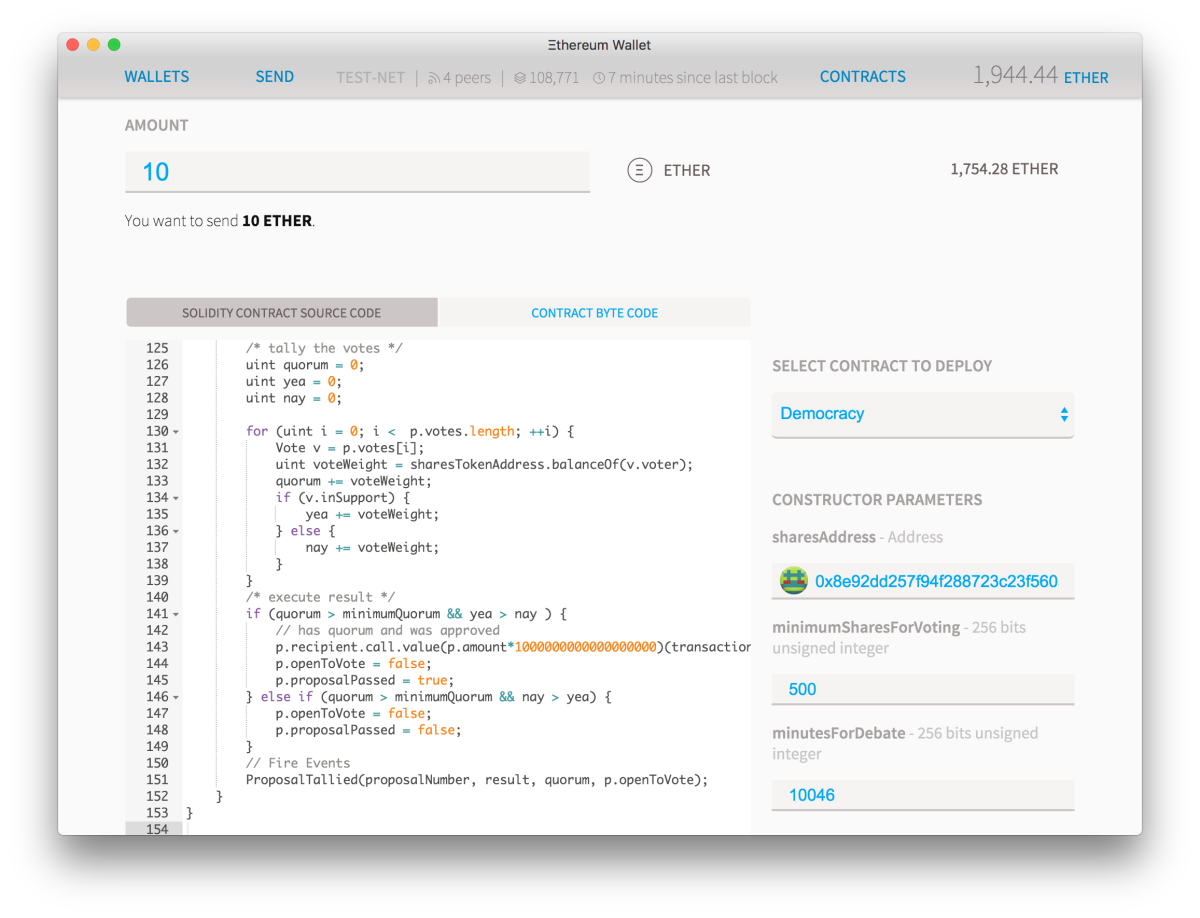The notion is right there, lingering between words in the first sentence of the founding document of the United States: “In order to form a more perfect union.”
In its tempered expectations, it conveys that a perfect union among the people of a nation is impossible. People are flawed. Some seek to dominate others. Some lie for their own gain. And often, well-meaning people from diverse backgrounds have different understandings and different goals for society.
This month, a designer from the Ethereum Foundation wrote a blog post, Ethereum in practice part 2: how to build a better democracy in under a 100 lines of code. The post is a tutorial for building a lightweight contract on the Ethereum blockchain platform. The contract has certain rules and parameters which are unalterable, and which execute automatically. People in the contract, which could be described quite literally as a social contract, may vote from wherever they are, within the allotted time frame. You can program a number of votes necessary for a quorum, and the percentage needed for a movement to pass.
“Now take a moment to let that in: you just created an organization that only exists on the blockchain, that obeys votes based on completely digital tokens, but yet it can move real value around and create a very real impact on the world,” the designer, Alex Van de Sande, wrote. “Also notice that the organization is not under your control anymore: it will execute only the exact code you used to create it, forever. You can’t bribe it, you can’t earmark it and the same rules apply either you are moving 0.01 or 1,000,000 ethers.”
Well hey, they might be on to something. These points speak to the heart of the inefficiencies of democracy, that you can buy people’s votes, that you can sway people with clever or frightening rhetoric, and that you can change the rules around the edges with redistricting, campaign finance laws (and their repeals), and the like.
“[One] aspect is that actions are difficult, if not impossible to reverse. Thus, electoral fraud gets reduced significantly,” explained Simon de la Rouviere, who works for the Brooklyn’s own blockchain outfit, ConsenSys. de la Rouviere is working on building a distributed app on Ethereum that allows anyone to issue tokens and manage them for whatever purposes they want to. He’s also 58 percent done with a book called The Computing Commons.
“The system runs like a swarm,” he wrote in an email:
The p2p (person to person) infrastructure connects with each other and follows the rules it was given. The organisational processes itself is also p2p. No one has outright control over the direction. There’s no board, no director, etc. To convince a swarm to move into a direction, you have to convince your 3 closest nodes to follow you, hoping they influence the others to do the same. Finally, you could start trying new experiments such as a liquid democracy, allowing others to delegate their votes to experts they know are knowledgeable on a subject. All automatic.
The blockchain, once seen by many as a shady backwater of the dark web, seems to be having a moment, particularly in finance. Wall Street banks are gobbling up promising financial technology (fintech) startups (many or nearly all of which are working on the blockchain or distributed ledgers or smart contracts in some form or another) at an unprecedented rate.

According to CB Insights, “One-third of all fin tech deals since 2009 by Wells Fargo, JPMorgan, Citi, Morgan Stanley, Goldman, and BofA have come in 2015 YTD.”
And just last week, the SEC approved a plan to allow companies to issue private securities via the blockchain. The approval was a huge win for Overstock.com CEO Patrick Byrne, who is a huge proponent of the blockchain and a huge critic of Wall Street. In a 2014 interview with WIRED, he described what the adoption of distributed ledgers and the blockchain would look like in the financial sector.
“You would have an instant, frictionless market, while having the added benefit of wiping out a whole parasitic class of society — that is, the whole financial industry,” he said.
The blockchain is about to become relevant to mainstream consumers. https://t.co/zRM3117Xr2 https://t.co/I8hjBQ3ukt
— Alex Howard (@digiphile) December 17, 2015
If the end result of the blockchain is the eradication of inefficient middlemen, and if it finds a use in the way democracy works, the future could be lean for the lobbyists, the access holders, all of the so-called “special interests” that every politician seems to agree the country would be better off without.
And that country would look a lot different. It could look, wait for it, more perfect.
Join the conversation!
Find news, events, jobs and people who share your interests on Technical.ly's open community Slack
